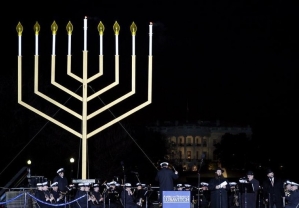Hanukkah, also known as the Feast of Dedication" or the "Festival of Lights", is an eight-day Jewish holiday that celebrates the rededication of Jerusalem's holy temple in 164 B.C. after it was defiled by a pagan ruler. It begins on the evening of December 24th and ends on January 1st of the next year.
While Hanukkah is observed by the Jewish community, it's important for Christians to understand the significance of this holiday, as it prepared the way for the birth and ministry of Jesus and reminds us of God's faithfulness and power.
History of Hanukkah
In 167 B.C., the Maccabees, from the priestly line of Aaron, rebelled against the Syrian king Antiochus IV, who desecrated the temple in Jerusalem with an altar to the pagan god Zeus, and tried forcibly to Hellenize the Jews.
After years of fighting, the Jewish zealots, led by Judah the Maccabee, miraculously experienced victory over the mighty Greek forces, defeating the evil king. The defiled old altar was demolished and a new one built, and the temple was rededicated. According to the story, only one vessel of sanctified oil was found, good for one day of fueling candles, yet it somehow burned for eight days. The miraculous eight days of burning is commemorated by the Menorah, or eight-branched candelabrum often associated with Hanukkah.
This rededication of the Temple to the God of Israel is celebrated during Hanukkah, officially established by King Hezekiah as seen in 2 Chronicles 29:17. The holiday is briefly mentioned in the Gospel: "And it was at Jerusalem the feast of the dedication and it was winter" (John 10:22).
Hanukkah Traditions
The holiday is celebrated with the lighting of the menorah, traditional foods, games and gifts.
The Menorah lighting is one of the most familiar traditions associated with Hanukkah. The menorah holds nine flames, one of which is the shamash ("attendant"), which is used to kindle the other eight lights. During the holiday, the first candle of the eight-branched lamp is lit on the first day; two candles lit on the second day, and so on until the eighth day when all the candles would be lit.
Before the menorah is lit, special blessings are often sung, and traditional songs are sung afterward.

It is also customary to play with a "dreidel", a four-sided spinning top bearing the Hebrew letters, nun, gimmel, hei and shin, an acronym for nes gadol hayah sham, "a great miracle happened there".
Hanukkah is also a time of feasting, with a number of foods fried in oil. Potato pancakes (known as latkes) and jam-filled donuts (sufganiyot) are particularly popular in many Jewish households. Other Hanukkah customs include exchanging gifts and rewarding children for positive behavior and devotion to Torah study throughout the year.
Hanukkah and the Christian faith.
Hanukkah remembers the Maccabean revolt and the re-dedication of the temple - a crucial time in history that saved the Jewish people and their religion from being annihilated by Antiochus. Had the evil king succeeded, there would have been no Jewish woman named Mary to become the mother of Jesus Christ, the Savior of the world. Without Hanukkah, the celebration of Christ's birth - Christmas - would not be possible.
Hanukkah celebrates a God who is capable of doing supernatural things, both in the Bible times and right now. God remained faithful to the Jews, allowing them to defeat the powerful Greeks against all odds. Thus, the holiday reminds us of God's faithfulness and power - even in the most impossible of situations.
"After 2000 years the oil of the Holy Ghost has not dried up," writes Pastor Paul Ciniraj. "The glow of eight candles burning together is much brighter than one...Though we may not fully understand all that God is doing we know that one day 'All the earth will be filled with the glory of the Lord'."







